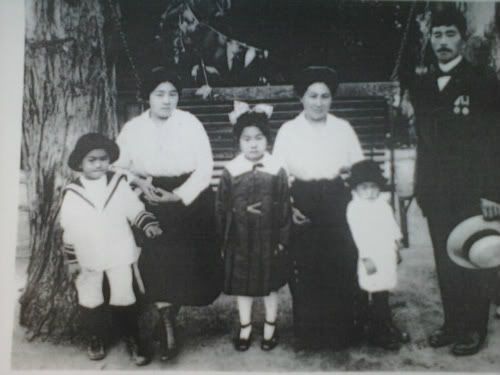During World War II, thousands of Japanese Americans were forcibly removed from their homes and placed in “internment” (i.e. concentration) camps because of the United States’ fear of Japanese spies. One such Japanese American was Betty Oba Masukawa, who was born and raised in Fullerton. In an interview for the CSUF Oral History Program, she recalls her experiences during WWII. I am amazed at the matter-of-fact way she recalls her experiences, and the fact that, years later, she is able to laugh about it:
CSUF: You mentioned evacuation. What was your major concern at the beginning of the war?
Betty: Honestly, I didn’t think anything of it, because I was born here. I didn’t pay any attention to any of the rumors, until it was really happening.
CSUF: How were you told about the evacuation?
Betty: It was in the newspaper.
CSUF: And what were your feelings at the time that you found out about the evacuation?
Betty: If we had to evacuate, we had to evacuate (laughter).
CSUF: What sorts of provisions did you make?
Betty: You mean our home?
CSUF: Yes.
Betty: The mayor of Fullerton, William Hale and his son Harold took care of all our things. We gave him power of attorney and he took care of our ranch; we had a ranch at that time. Well, it was my parents’ ranch. He took care of all our personal belongings for us, so we had no worry.
CSUF: Was he a friend of your family?
Betty: Yes, a very good friend. The whole family was very good. My personal things he took to his house, and he stored it up in his room, which he didn’t have to; he could have just put it in the garage. But, no, he put it in his house, and really took very good care.
CSUF: Where were you then sent?
Betty: We were sent to Poston, Arizona.
CSUF: From Fullerton?
Betty: From the Anaheim train station. We were the last family to go from Orange County.
CSUF: Were you notified in some way that you were to…
Betty: Yes. At that time my daughter…We were supposed to go at a certain time, a certain date. But we could not make it, because my daughter had chicken pox or measles, one of the two. So we asked if we could wait and be the last ones to go. So they were very kind and let us wait so I wouldn’t have to leave her at the Orange County Hospital, by herself and then we’d be gone. So they let us stay ten more days, anyway.
CSUF: And you went on the train?
Betty: Yes.
CSUF: What were you able to take with you?
Betty: Just your personal belongings. One suitcase. But I told the Army fellows that, “I have a child, and I have to have more than one suitcase.” So they passed it. I got to take more…We took a trunk then. But they said, “Don’t tell everybody that you’re taking a trunk.” (laughter)
CSUF: And what was it like when you arrived in Arizona?
Betty: Terrible.
Betty’s husband (Mas): It was hot and dusty. Rattlesnakes all over.
Betty: If it wasn’t rattlesnakes, it was scorpions.
CSUF: What was the physical building that you lived in at Poston like?
Betty: Like barracks, a lot of cracks in it, you know, so the dust could go through.
CSUF: Oh dear. What time of year was that?
Betty: In May. A really hot time. It was really hot.
CSUF: You were in a barracks with how many people?
Betty: Well, each barrack had four rooms; it was all partitioned. We had the font, and it was a larger one. The dust blows, and everything gets dusty inside. You can just have tears, you know. But gradually, we were getting mail orders, like Sears or Montgomery Ward, to make it look more like a home. Eventually they gave us linoleum for the floor, which is very good. Or course, we had to buy all our window shades and things like that. And dinner sets, also, because sometimes we’d go to the mess hall and bring the food home to eat.
CSUF: What was your occupation while you were there?
Mas: She worked at the beauty shop.
Betty: To begin with, I knew the police chief; he was from Anaheim. He (Kiyoshi Shigekawa] asked me if I’d like a job. So he gave me a job as police matron. That’s a laugh, isn’t it? (laughter) So I was in the police department for a while, and then I got into the beauty work. They had classes. I met the two girls; there were only two girls who had a license. They were leaving for Chicago. Eventually everybody could go out from the camp, you know. So they went to Chicago, and I took over as head of the beauty shop in Poston.
CSUF: Had you ever done anything like that before?
Betty: No. But since they were licensed girls, they showed me everything…
CSUF: And what about your husband? What was he doing?
Mas: I was in the police department.
Betty: He took care of the baggage.
CSUF: Of the people that were coming in?
Mas: Coming in and going out.
CSUF: So your little girl was how old when you went to Poston?
Betty: Four years old. There was a class in front of our barracks, so she went to school there.
CSUF: Was there a social life going on in camp?
Betty: Yes. There were dances.
Mas: Outdoor baseball.
Betty: Outdoor theater.
CSUF: Do you have any special memories about that period of time?
Betty: Well, a group of friends would come over to our apartment, and we’d play cards and stuff for the evening. That’s about all we could do in the evening.
CSUF: And how long were you in Poston?
Betty: Three and a half years.

Oba family, 1918. Betty is the little girl in the middle.
